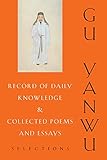Record of Daily Knowledge and Collected Poems and Essays : Selections / Yanwu Gu.
Material type: TextSeries: Translations from the Asian ClassicsPublisher: New York, NY : Columbia University Press, [2016]Copyright date: ©2016Description: 1 online resource (352 p.)Content type:
TextSeries: Translations from the Asian ClassicsPublisher: New York, NY : Columbia University Press, [2016]Copyright date: ©2016Description: 1 online resource (352 p.)Content type: - 9780231170482
- 9780231542678
- 895.18/4809 23
- PL2716.A2 2017
- online - DeGruyter
| Item type | Current library | Call number | URL | Status | Notes | Barcode | |
|---|---|---|---|---|---|---|---|
 eBook
eBook
|
Biblioteca "Angelicum" Pont. Univ. S.Tommaso d'Aquino Nuvola online | online - DeGruyter (Browse shelf(Opens below)) | Online access | Not for loan (Accesso limitato) | Accesso per gli utenti autorizzati / Access for authorized users | (dgr)9780231542678 |
Browsing Biblioteca "Angelicum" Pont. Univ. S.Tommaso d'Aquino shelves, Shelving location: Nuvola online Close shelf browser (Hides shelf browser)

|

|

|

|

|

|

|
||
| online - DeGruyter Death and Mastery : Psychoanalytic Drive Theory and the Subject of Late Capitalism / | online - DeGruyter Sex Trafficking : Inside the Business of Modern Slavery / | online - DeGruyter The Corsairs of Saint-Malo : Network Organization of a Merchant Elite Under the Ancien Régime / | online - DeGruyter Record of Daily Knowledge and Collected Poems and Essays : Selections / | online - DeGruyter Japanese War Criminals : The Politics of Justice After the Second World War / | online - DeGruyter Trash Cinema : The Lure of the Low / | online - DeGruyter Pier Paolo Pasolini : Performing Authorship / |
Frontmatter -- Contents -- Acknowledgments -- Bibliographical Abbreviations -- Introduction -- Part I. Essays from the Record of Daily Knowledge (Rizhi Lu—RZL) -- 1. RZL 1–7: The Classics -- 2. RZL 8–12: Administration and Economics -- 3. RZL 13–15: Customs and Mores -- 4. RZL 16–17: The Examination System -- 5. RZL 18–21: Literature and Philosophy -- 6. RZL 22–32: Miscellaneous -- Part II. Essays, Letters, and Prefaces from Collected Poems and Essays (Tinglin Shiwenji—SWJ) -- 1. SWJ 1: Statecraft Essays -- 2. SWJ 2: Prefaces -- 3. SWJ 3: Letters 1 -- 4. SWJ 4: Letters 2 -- 5. SWJ 5: Records, Inscriptions, and Other Writings -- 6. SWJ 6: Miscellaneous -- Part III. Poems from Collected Poems and Essays (Tinglin Shiwenji—SWJ) -- Appendix 1. Biographical Summary -- Appendix 2. Works by Gu Yanwu -- Appendix 3. Zhang Binglin’s Preface to Huang Kan’s Rizhi Lu Jiaoji -- Appendix 4. On the Feudal System (Fengjian Lun)— Liu Zongyuan -- Notes -- Bibliography -- Index
restricted access online access with authorization star
http://purl.org/coar/access_right/c_16ec
Gu Yanwu pioneered the late-Ming and early Qing-era practice of Han Learning, or Evidential Learning, favoring practical over theoretical approaches to knowledge. He strongly encouraged scholars to return to the simple, ethical precepts of early Confucianism, and in his best-known work, Rizhi lu (Record of Daily Knowledge), he applied this paradigm to literature, government, economics, history, education, and philology. This volume includes translations of selected essays from Rizhi lu and Gu Yanwu's Shiwen Ji (Collected Poems and Essays), along with an introduction explaining the personal and political dimensions of the scholar's work.Gu Yanwu wrote the essays and poems featured in this volume while traveling across China during the decades immediately after the fall of the Ming Dynasty. They merge personal observation with rich articulations of Confucian principles and are, as Gu said, "not old coin but copper dug from the hills." Like many of his contemporaries, Gu Yanwu believed the Ming Dynasty had suffered from an overconcentration of power in its central government and recommended decentralizing authority while strengthening provincial self-government. In his introduction, Ian Johnston recounts Gu Yanwu's personal history and reviews his published works, along with their scholarly reception. Annotations accompany his translations, and a special essay on feudalism by Tang Dynasty poet and scholar Liu Zongyuan (773–819) provides insight into Gu Yanwu's later work on the subject.
Mode of access: Internet via World Wide Web.
In English.
Description based on online resource; title from PDF title page (publisher's Web site, viewed 25. Jun 2024)


